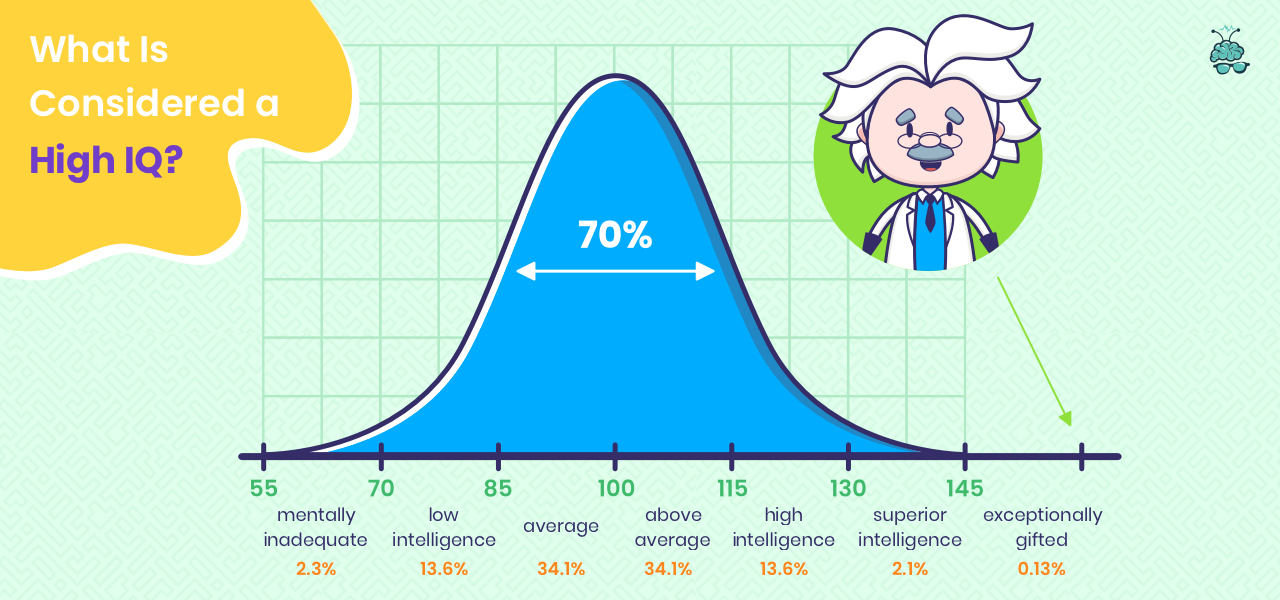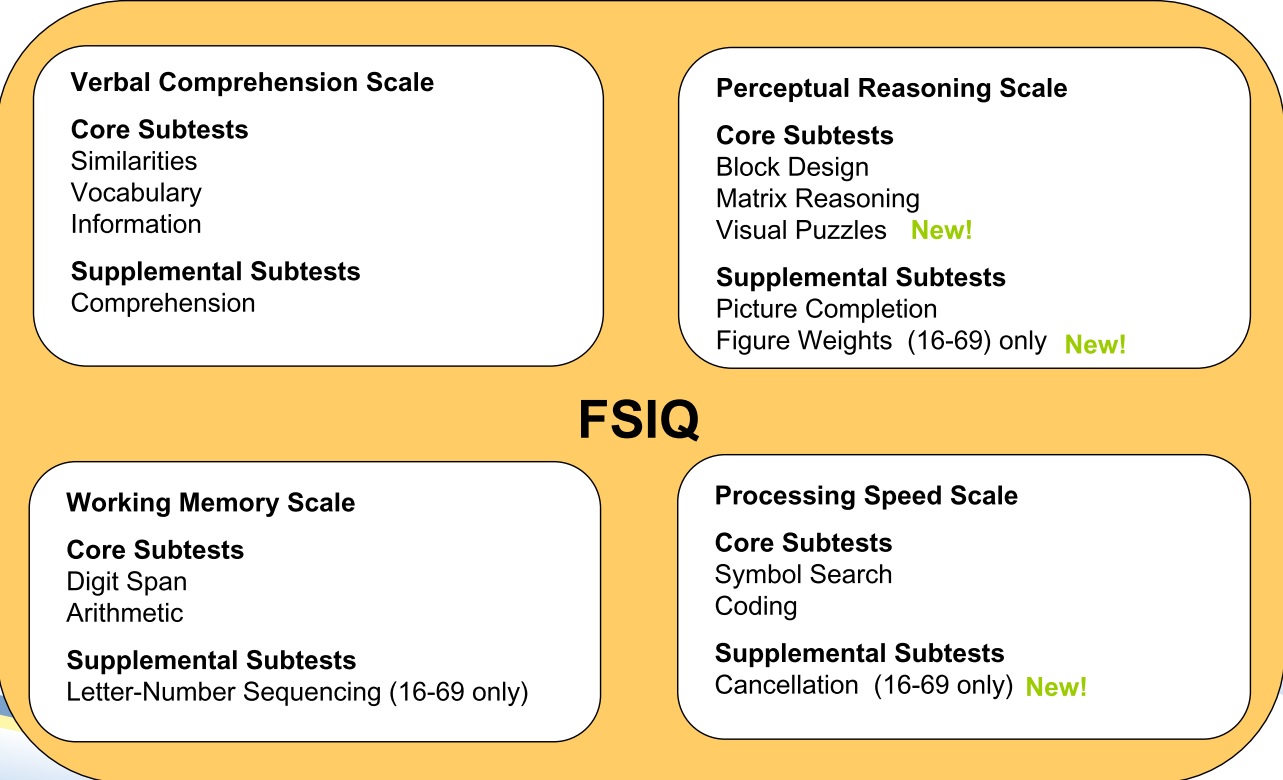-
What is Considered a High IQ? Here’s Everything Need to Know About Intelligence Quotient

IQ has been used as an indicator of human intelligence for over a century now. The higher the IQ score, the more intelligent the person is and vice versa. So — what is considered a high IQ? An IQ score of 120 is higher than average, 140 is a gifted intellect, and anything above 160 — a genius.
But what do all these numbers mean and how IQ is measured? And above all, how much reliable IQ tests can be? Let’s find out.
What Exactly Is IQ?
In simple words, IQ is the measurement of intelligence represented in numbers. It is a score of a test that indicates an individual’s cognitive ability compared to the peer group or the general population.
An IQ score of 100 is taken as the median. And in most of the tests, a score between 90 to 110 (10 points less or more than the median) represents average intelligence.
Here’s the IQ classification by score as per Stanford–Binet Intelligence Scale Fifth Edition:
IQ Range (“deviation IQ”) IQ Classification 145–160 Very gifted or highly advanced 130–144 Gifted or very advanced 120–129 Superior 110–119 High average 90–109 Average 80–89 Low average 70–79 Borderline impaired or delayed 55–69 Mildly impaired or delayed 40–54 Moderately impaired or delayed Today’s standard IQ tests are largely based on Alfred Binet’s IQ test that was devised in the early 1900s. The test was developed to identify the students’ intelligence and accordingly provide academic help.
Binet’s IQ test was based on the concept of mental age. It measured the mental age of the child with respect to the actual chronological age. The test consisted of questions related to reasoning and knowledge as per the age group. The present-day IQ tests are quite similar and the results are compared to the peer group.
Understanding IQ Terms
In order to understand the IQ score, you’ll need to have an idea of the key terms used — such as bell curve, mean and standard deviation.
Bell Curve: A bell curve is a graphical representation of the IQ score. If you put the scores on the graph, it will form a bell-shaped curve. The head of the bell is where the IQ score of the majority of the people lies. The left side of the slope is where the lower than average scores are plotted while on the other side you’ll see the scores above average.
Mean: Mean refers to the average IQ score. It is obtained by adding all the scores of the people together and then dividing it by the total number of people.
Standard Deviation: Standard deviation represents the variation in the score. A high standard deviation indicated that there is a vast difference between the scores from the average while a low standard deviation shows the difference in the value of the score is less.
What Do IQ Tests Measure?
IQ tests are designed to measure how good a person is in grasping concepts and solving problems. Thus, a standard IQ test includes a variety of categories to measure your cognitive abilities including:
- Reasoning abilities – the ability to understand and remember spatial relations among objects.
- Processing speed – the time taken to perform a cognitive task.
- Language – understand spoken and written language.
- Memory – ability to recall information.
- Math – to measure problem-solving and logic skills.
Here’s what the test structure of the Wechsler Adult Intelligence Scale, the most widely used IQ test looks like:

These tests measure both your fluid and crystallized intelligence. Fluid intelligence is the ability to reason and think flexibly to come up with a solution in new situations. Whereas, crystallized intelligence is the understanding, knowledge, and facts we accumulate throughout life.
Suggested Read: Theory of Multiple Intelligence
How Reliable Are IQ Tests?
The standardized tests taken in ideal conditions adjudicated by a professional are designed to get accurate results. These are the test you can trust — not the ones that pop up in your social media feeds. It is the formal and standardized IQ tests that can measure intelligence and not the haphazard questions that show you result in 10 minutes. Some of the popular IQ tests include the following:
- The Stanford-Binet Intelligence Scales
- The Wechsler Adult Intelligence Scale for Adults
- The Wechsler Intelligence Scale for Children
- The Kaufman Assessment Battery for Children
- The Woodcock-Johnson Tests of Cognitive Abilities
- The Cognitive Assessment System
Moreover, factors such as health conditions, environment, and culture may affect IQ scores. Even if you have tried your best while attending the tests but conditions like sleep deprivation can affect the scores.
Can Learning Improve IQ?
Though these tests also consider crystallized intelligence, learning new information would not automatically boost your IQ score. Kim Ung-Yong, a former world record holder for the highest IQ learned both the Korean alphabet and 1,000 Chinese characters by the age of one and at three he could solve calculus problems. He didn’t learn to improve his IQ, he was born with it.
However, some studies even show how education can improve the IQ score of kids. This makes the topic controversial. To explain if one can improve his IQ, Jack Naglieri, a research professor at the University of Virginia, in an article describes that learning can help make people function better rather than making them smarter. He says:
“…You can teach a child to better utilize their ability to plan, and that improves their academic performance not only in math, but in reading comprehension. So, what I would say, is we didn’t make the children smarter, but we taught them how to use what they have more efficiently, and better.”
But whether learning improves your IQ scores or not, it definitely aids mental functioning and one should adopt the habit of lifelong learning. Activities such as reading, socializing, playing a musical instrument, or even solving puzzles provide mental stimulation — that’s key for a healthy mind.
Wrapping Up
The human brain is complex and so is measuring intelligence. But IQ tests have made it possible to measure it and present it statistically. Since the early 1900s when it was devised, IQ has become a popular part of education, military, workplace, and beyond — making it a successful invention in psychology.
 77361
77361







